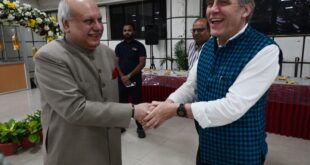by: Asad Mirza
Finance Minister Nirmala Sitharaman presenting the Union Budget 2020 has suggested a new education policy, besides several measures that will bring in a paradigm shift in the educational system and creation of employment.
According to the FM, by 2030 India is set to have the largest working-age population in the world. Not only do they need literacy but they need both job and life skills. The budget earmarked Rs 99,300 crore for education sector in 2020-21 and about Rs 3,000 crore for skill development. In the previous Union Budget, the government’s allocation for the sector was Rs 94,800 crore. It’s a meagre increase of 3.4% as compared to defence sector increase of 5.8%. Though India’s expenditure on education has increased in the last six years, but it needs to be raised to nearly 6% of the GDP by 2022
The FM said about 150 higher educational institutions will start apprenticeship embedded degree/diploma courses by March 2021 and will start a programme whereby urban local bodies across the country would provide internship opportunities to fresh engineers for a period up to one year.
To create infrastructure in education sector, steps would be taken to enable sourcing External Commercial Borrowings (ECB) and FDI so as to able to deliver higher quality education.
However, while appreciating the rural thrust of Budget 2020, Swadeshi Jagran Manch (SJM) an affiliate of the RSS, criticised Sitharaman’s move to open foreign direct investment in education.
Ashwani Mahajan, national co-convenor of the RSS affiliate that deals with economic issues said the issue would be discussed further and a decision will be made on how to take up the matter with the Modi government. Appreciating the rural thrust of Sitharaman’s budget, Mahajan said the government has tried to create more jobs in the rural sector.
The SJM, a frequent critic of the Modi government, has been pushing back against foreign-owned companies, particularly e-commerce giants Amazon and Flipkart.
The budget also suggested under the ‘Study in India’ programme, Ind-SAT, will be held in Asian and African countries to benchmark foreign candidates who receive scholarships for studying in Indian higher education centres. But much needs to be seen, how this initiative will help as it may result in a drop in number of foreign students opting for India.
It’s disappointing that the government hasn’t passed on any benefits for the edu-tech and skill-tech sectors by extending tax benefits and incentives for players, corporate or education institutions by giving tax exemption.
Finance Minister also announced that along with the State Education Ministries, a new education policy would be announced soon.
It would be pertinent to note that the Draft National Education Policy (NEP) 2019 prepared by a committee chaired by Dr K. Kasturirangan was shared by the Ministry of Human Resource and Development for public comments in June last year.
The policy aims at making India a knowledge superpower by equipping students with the necessary skills and knowledge. It also focuses on eliminating the shortage of manpower in Science and Technology, academics and industry. The Draft Policy is built on foundational pillars of Access, Equity, Quality, Affordability and Accountability.
The NEP 2019 found it drawn into a high-profile controversy soon after the ministry of human resources development posted it online for soliciting feedback. The point of contention: the NEP’s recommendation that Hindi be mandated as one of the three languages of study in school. The opposition in south India, especially in the state of Tamil Nadu, was so strong that the NEP committee swiftly withdrew the linguistic policy mandate at issue.
A further critical study of the 484-page NEP 2019 reveals an issue deserving of wider, more heated opposition. The words “secular” or “secularism” are not found anywhere in the NEP 2019.
In contrast to the earlier policies of mentioning secularism as a core Indian value for the Indian education, the omission of the words “secular” and “secularism” in the NEP 2019 is odd.
Indeed, the NEP’s frequent affirmation of its aim of inculcating constitutional values in education makes it doubly odd. If the BJP is really interested in inculcating discipline and nationalism amongst the youth of the country, then it could introduce compulsory military training for a three or five years period, for students completing their school education, before they could apply for graduate courses. This apart from imbuing in them a discipline and love for the country will also help to weed out those who are not fit for professional degree courses, through the continuous assessment during their military internship. This may also help in controlling the unemployment mess for a limited period.
The absence of a clear commitment to secular ideals simply does not guarantee that the other ideals of pluralism and diversity that the NEP 2019 abides by will be realised.
This constitutes a departure from the existing model of secular education in the country and violates constitutional guarantee, which states, ‘no religious instruction is to be provided in any educational institution wholly maintained out of state funds (Article 28 (1))’.
In contemporary India, which has seen a sharp rise in caste and religious violence, the curriculum and teaching methods in Indian classrooms clearly have a dominant role to play in making caste and religious prejudice in society irrelevant. The challenge is to find fresh and creative ways of making young minds grasp these difficult social realities. Seriousness in this regard should have been integral to the NEP 2019.

Asad Mirza is a Sr journalist based in New Delhi.
In his career spanning more than 20 years, he was also associated with BBC Urdu Service and Khaleej Times of Dubai.
He writes on Muslims, educational and international affairs issues.
Email: asad.mirza.nd@gmail.com
 Gawah (The Witness) – Hyderabad India Fearless By Birth, Pristine by Choice – First National Urdu Weekly From South India – Latest News, Breaking News, Special Stories, Interviews, Islamic, World, India, National News
Gawah (The Witness) – Hyderabad India Fearless By Birth, Pristine by Choice – First National Urdu Weekly From South India – Latest News, Breaking News, Special Stories, Interviews, Islamic, World, India, National News



